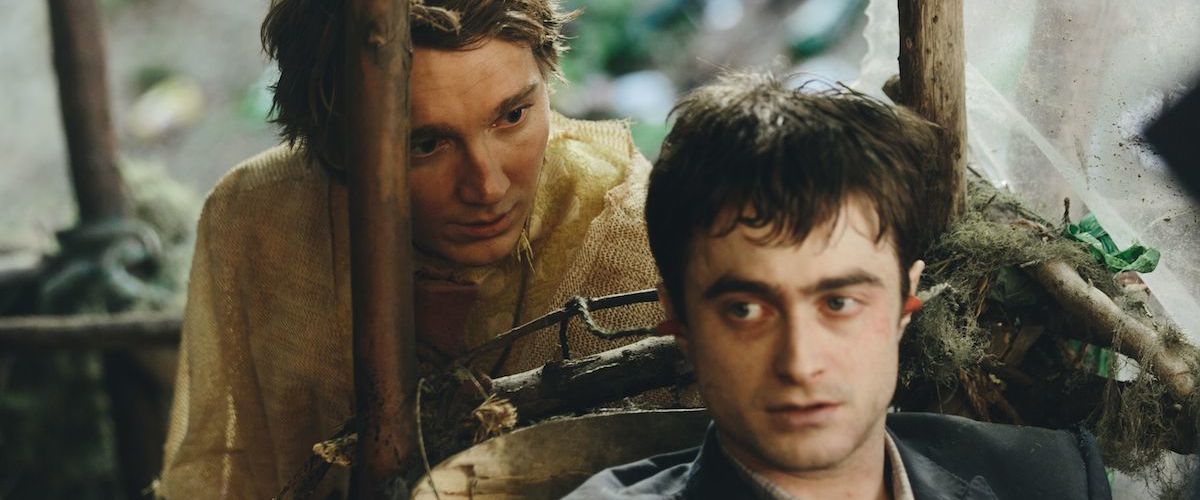One thing you definitely can’t say about “Swiss Army Man” is “Oh, not that again.”
This film from the writer-director team of Dan Kwan and Daniel Scheinert (who are billed as The Daniels) starts on a deserted island, with a depressed man named Hank (Paul Dano) interrupting a suicide attempt to check out what he thinks is a shipwreck survivor (Daniel Radcliffe) who’s washed ashore nearby. The man is dead, and very flatulent. Hank doesn’t manage to bring him back to life, but his resuscitation attempts make the corpse spew fresh water from its mouth like an old fashioned hand-pumped faucet and increases his expenditure of gas.
Hank rides the corpse through the waves like a jet ski until they both make landfall, then carries him on his back through the forest like Luke Skywalker carrying Yoda, talking to him about life, love, and what it means to be human. The corpse, whom Hank meaningfully dubs “Manny,” has the power of speech, but has forgotten everything, so Hank tells him everything he knows. Manny’s relationship to Hank is that of a trusting young child and his father, though not exclusively. At various points in “Swiss Army Man,” the central duo could be likened to buddies in a buddy picture, boyfriend-girlfriend, Pinocchio and Gepetto, and partners in an extended outdoor theatrical improv exercise. One of the longest sequences is set in a cave whose border forms a proscenium arch across the screen; in time the men build an elaborate “set” there, out of garbage, and re-enact a key moment in a man’s life. The title describes the way that Hank discovers and utilizes Manny’s different abilities: in addition to being a gas factory, a jet ski and a water pump, he’s a “gun” who can spit objects at high speed, an “axe” who can chop things with his arm, and more.
You’re always aware of the various component parts that fed the filmmakers’ imaginations (mainly other movies, music videos, and perhaps children’s books and fairy tales), but “Swiss Army Man” is such a Frankenstein-like amalgam of bits and pieces—interesting that of all the literary comparisons I could have made, I jumped to a novel about a man trying to reanimate dead tissue; this film sure does a number on your subconscious!—that you can’t fairly describe it as being entirely “like” any one thing. The trailer-for-itself editing style of some sections, coupled with the religiously inflected and chant-driven score (by Manchester Orchestra’s Andy Hull and Robert McDowell) and shots of sunlight streaming down through forest canopies, make it feel like “Terrence Malick’s Weekend at Bernie’s.” There are moments that evoke Spike Jonze’s film version of “Where the Wild Things Are” and “Peter Pan” and the collected works of David Lynch and the Pleasure Island scenes of “Pinocchio” and so on.
The film is elastic, transmogrifying from a psychological drama into a literally excremental comedy and then a hard-edged survival picture, occasionally embracing the cosmic and turning into an emo hipster answer to “2001: A Space Odyssey.” And yet the emotional temperatures of the movie fluctuate so intuitively from moment to moment, and the situations and editing choices along with them, that there’s ultimately no point trying to deal with “Swiss Army Man” on any terms but its own.
It’s common for critics to describe a film as “dreamlike,” but what does that word mean? Most of the time it means that a movie is filled with strange and not necessarily realistic imagery and situations, or that the storytelling prizes incidents and moments of raw feeling. “Swiss Army Man” fits all of those descriptions, but it’s dreamlike in a deeper sense: like a dream, its structural logic is entirely emotional. Notice, for instance, how the rhythm of the cutting is attuned to Manny and Hank, speeding up when they are talking quickly and slowing down when we’re observing them in repose. Notice, too, how the movie uses music: sometimes Hank or Manny or both will start singing along with the score, while other times the score will seem to be taking cues from them, even listening to them and following their lead. (John Williams’ score for “Jurassic Park”—not coincidentally a Frankenstein story—gets quoted more than once.)
The performances are just as supple. Dano’s earnestness, which has been used for unsettling effect in some films, is showcased straightforwardly here, so that Hank seems a damaged but good man working through a personal catastrophe. (The whole film could be his dream.) Radcliffe’s work takes Manny far beyond one-joke status. Though the performance is mainly kindhearted and guileless, suggesting a child in an adult’s body, there are times when Radcliffe’s delivery is so anguished, like a victim of a severe neurological trauma teaching himself to speak or walk again, that it’s painful to watch.
Even the most outrageous, self-consciously broad touches, such as the numerous fart jokes, have the crystalline feeling of situations encountered in a dream. Certain moments in dreams seem very silly or very stupid when you describe them to others afterward, but when you’re experiencing them, they’re intense, maybe not funny at all, or so purely emotional that they rip through any ironic detachment you carried into your slumber and affect you in a piercingly direct way, as a young child might react to twists in a bedtime story that a parent made up on the spot.
The movie is not as endearing as it sometimes wants to be, it strains too hard to wow us at times, the introduction of a “seize the day” message reduces it, and in the end there may not be not enough plot, or situations—or whatever you want to call the film’s amalgamation of incidents—to justify a feature length running time. (Like some dreams, it has several endings when one would have been plenty.) But “Swiss Army Man” is still mightily impressive for its commitment to its vision and its refusal to explain itself. The Daniels have made a film that’s at once a labor of love and a work of sheer arrogant nerve, one that is as likely to be described as a classic, an ambitious misfire, and one of the worst films ever made by any three people who see it together. How many movies can you say that about?




















